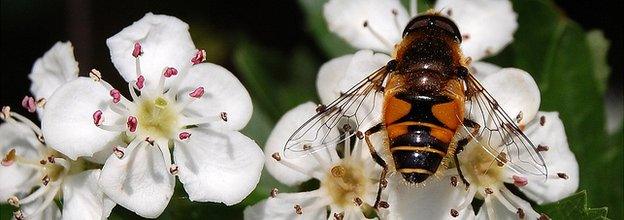Public forests must not be sold, say advisers
- Published
- comments

The panel was tasked to consider the role played by publicly owned forests
Independent advisers appointed by the government say England's publicly owned forest estate is a national asset and should not be sold off.
<link> <caption>In its final report to ministers</caption> <url href="http://www.defra.gov.uk/forestrypanel/files/Independent-Panel-on-Forestry-Final-Report1.pdf" platform="highweb"/> </link> , the panel added that woodlands could help "drive a sustainable economic revival".
The panel was set up in March 2011 after a ministerial U-turn on plans to sell off a chunk of its woodlands.
The government says it accepts the recommendation and will halt plans to sell-off state-owned forests.
At the time, more than half-a-million people signed an online petition to protest against the policy.
<link> <caption>The Independent Forestry Panel</caption> <url href="http://www.defra.gov.uk/forestrypanel/" platform="highweb"/> </link> - headed by the Right Reverend James Jones, Bishop of Liverpool - published its final report on Wednesday.
<bold>'New culture needed'</bold>
The panel said it had received more than 42,000 responses from individuals and organisations regarding the future of England's forests.

Recent studies have identified a link between woodlands and human well-being
"We need a new culture of thinking and action around wood and woodlands," the Rt Rev Jones said in the report's foreword.
"[We need] a new way of valuing and managing the natural and social capital of our woodland resource, alongside the timber they contain."
Responding to the panel's findings, Woodland Trust policy director Hilary Allison said: "We are delighted that the Independent Panel on Forestry has unequivocally recommended... that the public forest should remain safe in public ownership."
Following the publication of the report, Environment Secretary Caroline Spelman said: "Our forests will stay in public hands. We will not sell the public forest estate.
"We'll be talking to all those who are passionate about our forests to decide how we will manage our forests for the future," she added.
The report's other recommendations included:
Measurably increase the quantity and quality of access to public and privately owned woodlands;
Ensure every child "has an element of woodland-based learning";
Protect current funding for woodland management and creation;
Increase England's woodland cover from 10% to 15% by 2060;
Create of a charter, and public forest estate should be "held in trust for the nation".
Campaigner Hen Anderson, co-founder of Save our Woods, said the only group that had been adamant that the nation's forest estate should remain publicly owned was the public itself.
"The fact that the panel has said that forests should remain public-owned is wonderful, but that is because of public pressure - we have made them say this," she told BBC News.
Ms Anderson added that she hoped that the government would continue to listen to the public, and involve them as it developed future forest policy.
Trade union Prospect voiced concern about what it sees as a lack of attention of financial cuts to Forest Research - the scientific arm of the Forestry Commission.
It said Forest Research was the "only grouping of forest scientists in the UK capable of delivering scientific advice and research on British forestry across a broad range of topics and disciplines" yet it was only mentioned twice in the panel's report.
"Forest Research has already suffered a 28%t cut in staffing which risks fundamentally compromising its ability to perform its functions," said Malcolm Currie, Prospect negotiator.
"Universities and research councils are not interested in doing this work. So who will? Indeed, who else can?"
Liberal Democrat peer and chairman of the Red Squirrel Protection Partnership Lord Redesdale announced that he was willing to lead a "community-based bid" to acquire Kielder Forest, the largest plantation in England.
He hope this business plan would act as a blueprint for other such partnerships, highlighting a way to balance conservation and amenities with providing jobs and income for the local economy.
<bold>'Got it wrong'</bold>
There was widespread outrage and opposition when the government originally announced its intention to sell 258,000 hectares of state-owned woodlands.
Ministers faced criticism from a variety of well-known figures, including the Archbishop of Canterbury, Annie Lennox and Dame Judy Dench.
As a result of the public backlash, Environment Secretary Caroline Spelman said that she had <link> <caption>got it wrong and put the sale on hold</caption> <url href="http://www.bbc.co.uk/news/uk-politics-12488847" platform="highweb"/> </link> .
Speaking back in February, she told MPs: "I'm sorry. We got this one wrong, but we have listened to people's concerns."
The government is set to issue a full response to the report in January 2013.
- Published4 July 2012
- Published19 June 2012
- Published8 May 2012
- Published25 November 2011
- Published17 March 2011
- Published17 February 2011